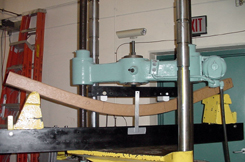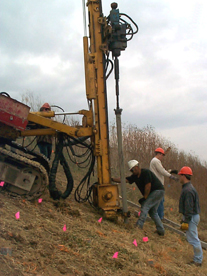U.S. Department of Transportation
Federal Highway Administration
1200 New Jersey Avenue, SE
Washington, DC 20590
202-366-4000
Focus
| Accelerating Infrastructure Innovations |
Publication Number: FHWA-HRT-04-024
Date: April 2004
Soils for highway embankments often deteriorate over time because of repeated wet-dry and freeze-thaw cycling. This eventually leads to recurring surface slope failures when the strength of the soil deteriorates to the point where it can no longer maintain stability. A popular technique for stabilizing new embankments or strengthening older slopes is soil nailing, which reinforces the earth slopes with arrays of slender pins driven or drilled into the soil. The pins support tensile loads and create a stronger soil mass overall. In an ongoing project, the Recycled Materials Resource Center (RMRC) at the University of New Hampshire is working with the Missouri Department of Transportation (MoDOT) and the University of Missouri-Columbia (UMC) to evaluate pins made from recycled plastics as a replacement for traditional pins made with steel and grout.
The recycled plastic pins (RPP) measure 90 mm by 90 mm by 2.4 m (3.5 in by 3.5 in by 8 ft). The project's design methodology estimates the resistance provided by each pin and then incorporates it into conventional slope stability analyses to calculate the improvement in the safety factor under various reinforcement scenarios. The objective is to determine the resistance that can be provided by an individual pin and, based on this, the number of pins required to increase the stability of a slope to an acceptable level. One difference when using recycled plastics is that modifications must be made to account for the reduced strength and increased ductility and creep exhibited by plastic materials.
Four field test sites have been established in Missouri since December 1999 to evaluate the load transfer mechanisms between the soil and reinforcement pins and the overall effectiveness of using RPP. An additional site was stabilized with similar-sized steel pipes for comparison. At three of the sites, several different reinforcement patterns have been used to determine how the reinforcing scheme and spacing impacts the effectiveness of the stabilization.
 |
 |
| Four-point bending tests are performed on recycled plastic pins. | Recycled plastic pins are driven into a slope using the percussion hammer from a track-mounted drilling rig. |
One test site near the town of Emma, Missouri, on Interstate 70 has been in place for 4 years, providing the most field performance data. The clay soil slopes at this site have experienced recurring surface slides over the past decade. Previous stabilization attempts were unsuccessful. Two areas at the site had RPP installed, while two other areas were simply regraded to serve as control sections. On one slope, 199 pins were installed perpendicular to the slope face, while on the other, 163 pins were installed vertically.
The site has been monitored for lateral movements, pore pressures, strains within the reinforcing pins, and lateral loads applied to the pins. "All of the stabilized slopes are performing well and the instrumentation indicates that the pins have significant remaining capacity to maintain the stability of the slopes," says project lead investigator Erik Loehr, an Assistant Professor at the University of Missouri-Columbia. In contrast, both control sites failed in spring 2001, during a period of higher than normal rainfall. While the RPP showed increased bending around the time of the control slope failures, they continue to provide reinforcement to the slope. To date, the vertically-oriented pins have provided better resistance to bending. The performance of the comparison site reinforced with similarly-sized steel pins has been similar.
The study has also looked at the long-term durability of RPP when subjected to various environmental conditions, such as exposure to freeze-thaw cycles and ultraviolet rays. Results of these tests indicate that the RPP are very durable. In general, plastics are much less susceptible to degradation when buried than timber, steel, or even concrete.
The field demonstration sites are now being used to evaluate the load transfer mechanisms in different slope conditions and to ascertain whether wider pin spacing can be used to reliably stabilize slopes. One problem that MoDOT and its partners have encountered is that there are dozens of manufacturers that produce plastic pins using different material formulations and processing techniques. This results in significant variability in the engineering properties of different pins. In addition, there are few common specifications for quantifying and reporting pin performance, so that different manufacturers characterize their pins using different criteria.
To help solve this problem, MoDOT and UMC are conducting uniform laboratory and field tests on different pins so that their properties can be directly compared. In the laboratory, uniaxial compression, 4-point bending, and accelerated creep tests are being used to characterize the mechanical behavior of the material, while field tests will evaluate the key issue of "drivability," or how well the pins can be inserted into the soil. Once this research is complete, the laboratory and field data, along with the data from the demonstration sites, will be used to develop standards and guidance documents, including a guidance specification for MoDOT and a recommendation to the American Association of State Highway and Transportation Officials for a recycled plastic soil pin specification.
For more information about the project, contact Tom Fennessey at MoDOT, 573-526-4340 (email: thomas.fennessey@modot.mo.gov), Erik Loehr at UMC, 573-882-6380 (email: eloehr@missouri.edu), or Taylor Eighmy at RMRC, 603-862-1065 (email: t.eighmy@rmrc.unh.edu).